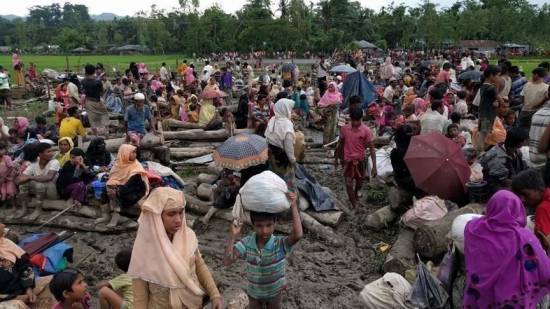Myanmar: More than 1M Rohingya in Bangladesh, over half million in Myanmar have been excluded from voting in Sunday's polls Featured
DHAKA, Bangladesh
Living in squalid makeshift tents in Cox’s Bazar, Bangladesh, more than one million Rohingya have been disenfranchised in the Sunday’s general elections in Myanmar, rising frustration among the persecuted people.
“According to international law, voting right is a fundamental right, but we are being denied by the government of Myanmar. We are citizens of Myanmar. So we must deserve the right of voting,” Khin Maung, a Rohingya youth in Bangladesh’s camps, told Anadolu Agency.
More than 1.1 million Rohingya refugees have been living in Bangladesh as stateless people, according to government figures.
The National League for Democracy (NLD) led by Aung San Suu Kyi won a landslide victory over the main competitor military-backed Union Solidarity and Development Party (USDP) in 2015 Myanmar elections.
Over 1.3 million minority Rohingya community living in Myanmar till then were disqualified from voting under the controversial 1982 Citizenship Law of the country.
But the Rohingya people wholeheartedly supported de facto leader Suu Kyi in the 2015 elections hoping she would pay heed to the legitimate rights of Rohingya.
The optimism, however, faded out after nearly 750,000 Rohingya fled the brutal military crackdown in Myanmar’s Rakhine state in August 2017.
Demand for vote under UN supervision
Also the founder of Rohingya Youth Association (RYA), Maung said: “We want to vote but we are being excluded by the NLD-led government. We had right to vote and elected parliament members from 1936 to 2010.”
Seeking the due role of UN, he argued that it should have taken initiative so that at least “registered Rohingya can exercise their voting rights.”
According to a late November 2019 report of the UN Refugee Agency, more than 800,000 Rohingya in Bangladesh’s camps have been registered by the agency in collaboration with the Bangladesh government.
Camp-based Rohingya leader Majhee Ansar Ali told Anadolu Agency that they were “deeply shocked” and “surprised” that despite repeated appeals by rights defenders, the Myanmar authorities were holding the elections excluding the country's minority ethnic groups.
“We never accept such polarized elections and it should not be accepted by the international community,” Ali added.
Also criticizing the move, another Rohingya at Bangladesh’s camps, said polls without Rohingya and other ethnic minorities are “totally against human rights.”
“I appeal to the international community to come in action against Burma [Myanmar] for discriminating minorities,” Nojemoullah cried.
Describing the election as “non-participatory” and “absurd”, Kyaw Win, executive director of UK-based Rohingya rights defender Burma Human Rights Network (BHRN), said the elections cannot be accepted in any standard.
“The decision of disenfranchisement of Rohingya and negating the votes of ethnic minorities in order to ensure an election is democratic is absurd on its face,” Win told Anadolu Agency.
He added: “It is especially telling that people historically oppressed by the military and government are the ones told that they cannot have a say in the general elections.”
Further human rights violations feared
In a statement on Friday, Burmese Rohingya Organisation UK (BROUK) warned against further escalation of the human rights situation in Myanmar due to controversial elections.
“The lack of international condemnation of the disenfranchisement of the Rohingya in Sunday’s election will encourage further human rights violations against the Rohingya people,” said the statement.
It added: “International governments and organisations, including the European Union, have even been assisting the government of Burma and the government appointed Union Election Commission (UEC) in the holding of this discriminatory election.”
Underlining the disenfranchisement of Rohingya in the elections as a violation of the provisional measures ordered by the top UN court, BROUK’s President Tun Khin said: “The disenfranchisement of the Rohingya in this election is another part of the genocide against us.”
Meanwhile, more than 37 million people were eligible to vote in the general elections to choose parliamentary members for the upper and lower houses of the Buddhist majority country with more than 54 million people.
Suu Kyi’s NLD is expected to bag another victory for the second consecutive term in the second democratic vote since the end of five-decade military rule.
But the polls held amid the coronavirus pandemic and armed clashes between military and Arakan Army, an armed rebel group, has gained criticism as nearly 2.6 million minority voters have been excluded for various excuses including security grounds.
New York-based international rights group Human Rights Watch dubbed the election “fundamentally fraud.”
Myanmar’s de facto leader Suu Kyi, however, has marked the election as a way to lead the nation to the path of “peace, development and long-lasting prosperity.”/aa
Additional Info
- عنوان تمهيدي: Rohingya frustrated over polarized elections in Myanmar


